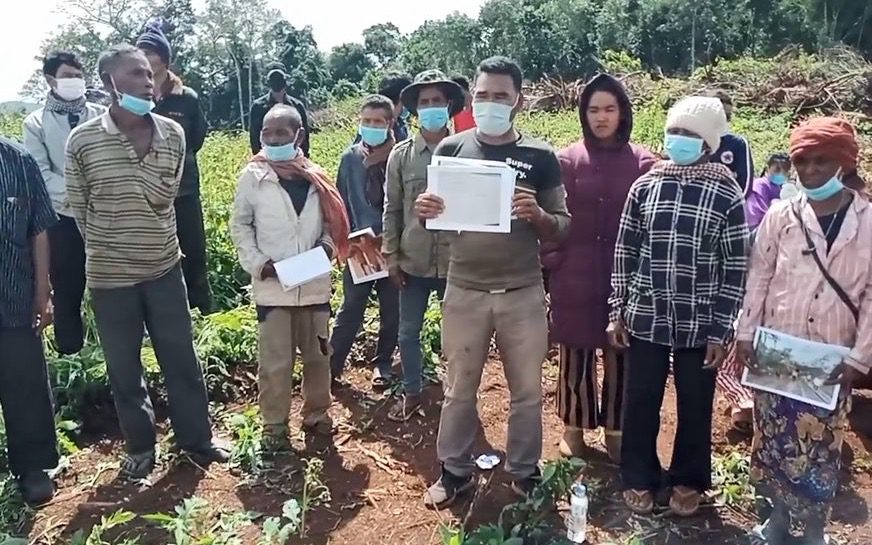Dozens of indigenous minority families from two separate disputes aired their grievances this week alleging irregularities with land titling and land encroachment, in a province where Interior Minister Sar Kheng recently told local officials not to abuse their power and illegally grab land.
Around 30 Bunong residents from O’Reang district’s Dak Dam commune gathered on Thursday in Pu Treng village and accused local authorities of collusion and issuing land titles for communal lands.
The dispute dates back to May, when Mao Chamroeun, head of Mondulkiri’s provincial land management department, issued a land title for little more than 80 hectares in the village to local tycoon Mam Vandy and his wife Tieng Phalla.
Svay Phen, a representative for around 60 families affected by the dispute, said the land was used by the community as a burial site, spirit forest and other forestland.
“Our land is inside the forest. Why is there a land title for it?” said Phen. “We were not happy and have gathered to protest and asked relevant authorities to find a solution.”
Phle Rach, another resident of Pu Treng village, said no one from the community had sold the land to outsiders and that loss of their communal lands will affect their livelihoods.
“We have lost our ancestral forestland that we have used to worship for a long time, we lost land for burials,” Rach said. “We have no more land for rotation farming and the younger generation will have no land for living.”
Mao Chamroeun and Mam Vandy could not be reached for comment on Thursday.
Mondulkiri has been a hotbed for illegal land grabs and land speculation. Minister Sar Kheng in October warned officials from engaging in land grabs and corruption.
Though the minister didn’t directly reference it, a government investigation from last year found that local Mondulkiri officials were involved in stealing state land and for encroaching on protected forests.The investigation linked former Mondulkiri governor Svay Sam Eang and nine officials to land grabbing, but apart from a few administrative transfers, none of the officials faced any serious legal action.
In his remarks last month, Sar Kheng did not address the lack of action against local officials implicated in these disputes and even praised former governor Sam Eang.
As a whole, Mondulkiri has seen increased land speculation and sales likely brought on by the announcement of a new airport in the province and its potential impact on tourism, disproportionately affecting indigenous minority communities.
The villagers of Pu Treng were not the only Bunong to protest land encroachment this week.
On Tuesday, three Bunong families representing a total of eight families, travelled to Phnom Penh to petition the ministries of interior and land management to protect land they said had been parceled away without their knowledge.
Those families, who are also from O’Reang district, say they had been using the land in question for more than 20 years. However, they allege district governor Siek Mony in 2020 secretly issued titles for and then encroached upon 42 hectares used by the families.
Their petition states they used the land to grow rice, cassava, cashew nut and jackfruit, while using some of it as grazing pastures for their cattle.
Mlus Ten, one of the petitioners, said governor Mony and his associates had threatened them with legal action for using the contested land.
“We are indigenous minority people and we have only little land for farming and to live. If they take it, we have no more land for farming,” Ten said.
Neither spokesperson for the ministries of land management and interior could be reached for comment.
Governor Mony only addressed the accusations from Pu Treng village and denied issuing any land titles to Mam Vandy. If Vandy had them, Mony said, it was because village residents had likely sold him their land.
“The title could have been made since before I took office as governor. It is not within my time. They just accuse me,” he said.
Kroeung Tola, a coordinator for the Mondulkiri Indigenous People Network, said local officials were taking advantage of ethnic minority groups who had little knowledge about land laws and procedures for land titling.
“The biggest mistake is from local authorities from the commune and district who have signed and processed documents. They have to be held responsible for this matter and punished,” Tola said.
(Translated and edited from the original articles on VOD Khmer)













